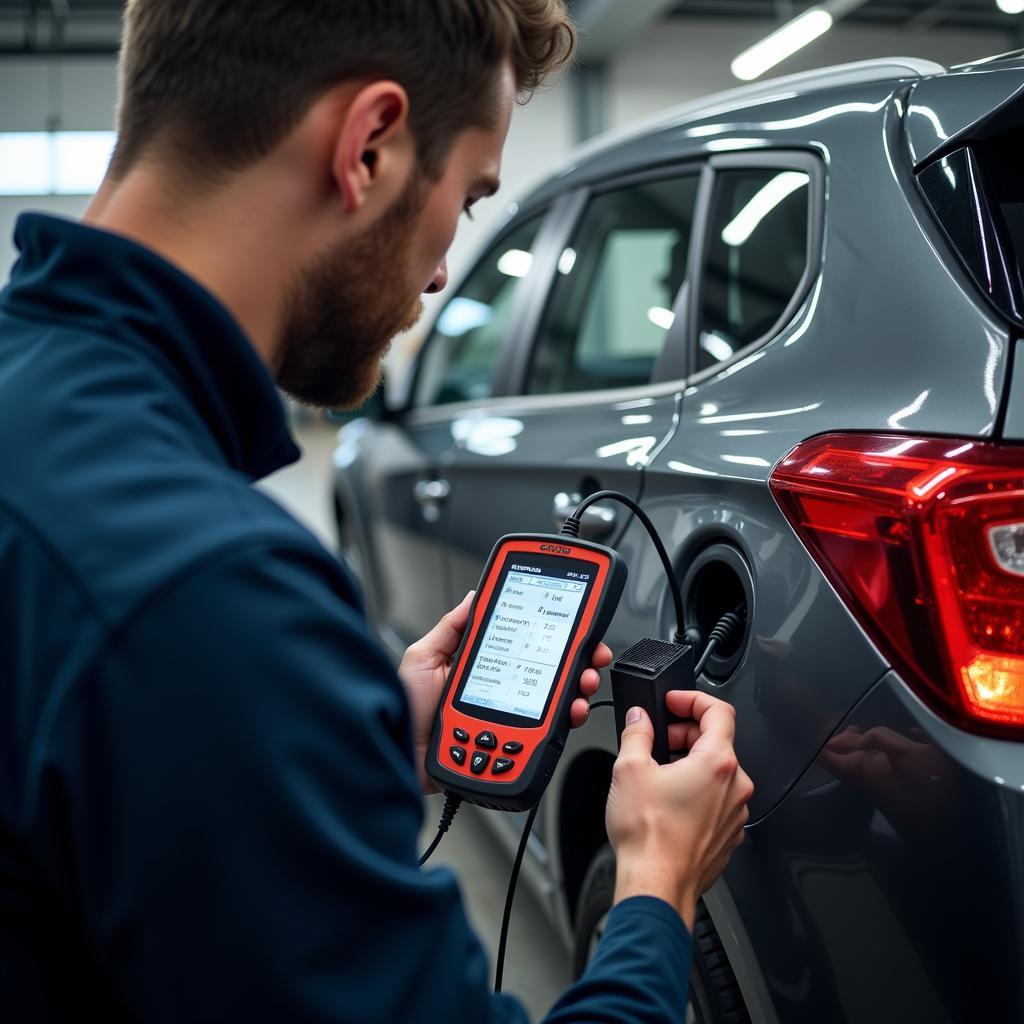Knowing when and why to book your car for a diagnostic test can save you time, money, and potential headaches down the road. This comprehensive guide covers everything you need to know about car diagnostic tests, from understanding their importance to choosing the right service provider.
Why is a Car Diagnostic Test Important?
Modern vehicles are complex machines equipped with sophisticated computer systems. These systems constantly monitor your car’s performance, flagging potential issues by triggering warning lights on your dashboard. A car diagnostic test taps into these systems, reading stored data and interpreting error codes to pinpoint the root cause of a problem.
When Should I Book a Diagnostic Test?
While some car problems manifest as obvious symptoms, others can be subtle or even silent until they escalate into major issues. Here are some common scenarios that warrant a diagnostic test:
- Illuminated Dashboard Warning Lights: The most obvious sign – whether it’s the check engine light, ABS warning, or another indicator – signals a potential issue requiring attention.
- Performance Problems: Experiencing rough idling, engine misfires, decreased fuel efficiency, or unusual noises? A diagnostic test can help identify the culprit.
- Pre-purchase Inspection: Before buying a used car, a diagnostic test offers valuable insights into its mechanical health and can reveal potential hidden problems.
- Routine Maintenance: Consider a diagnostic test as part of your regular maintenance schedule to catch potential problems early on and prevent costly repairs in the future.
 Mechanic Performing Diagnostic Test
Mechanic Performing Diagnostic Test
What Does a Car Diagnostic Test Reveal?
A car diagnostic test provides a detailed report about your vehicle’s health, encompassing:
- Engine Performance: Analyzing parameters like fuel/air mixture, ignition timing, and emissions control systems.
- Transmission Function: Evaluating gear shifting, clutch operation (if applicable), and overall transmission health.
- Brake System: Checking for issues within the ABS, traction control, and other brake components.
- Electronic Systems: Diagnosing problems in modules controlling airbags, power steering, lighting, and other electrical components.
How to Choose a Car Diagnostic Service?
Finding a reliable and trustworthy service provider is crucial for accurate diagnosis and effective repairs. Consider these factors:
- Experience and Expertise: Opt for mechanics or workshops specializing in diagnostics, particularly for your car’s make and model.
- Equipment and Technology: Ensure they utilize the latest diagnostic equipment and software to provide comprehensive and accurate results.
- Reputation and Reviews: Check online reviews and testimonials to gauge customer satisfaction and service quality.
- Transparency and Communication: Choose a provider who clearly explains the diagnostic findings, repair options, and associated costs.
[mobile car diagnostics near me](https://diagfixpro.com/mobile-car-diagnostics-near me/)
What Happens After the Diagnostic Test?
Once the test is complete, you’ll receive a detailed report outlining any identified issues. The technician will explain the findings, discuss potential causes, and recommend necessary repairs. Remember, a diagnostic test identifies problems; it doesn’t fix them. You’ll need to authorize and schedule the recommended repairs separately.
beginners book on car diagnostic tests
How Much Does a Car Diagnostic Test Cost?
The cost varies based on factors like your location, the service provider, and the complexity of the diagnosis. Generally, expect to pay between $80 to $150 for a standard diagnostic test. Some workshops might offer free or discounted diagnostics as part of a larger repair service.
Car Diagnostic Tests: Essential for Modern Vehicle Health
Car diagnostic tests play a vital role in maintaining the health, performance, and longevity of your vehicle. By understanding their importance, knowing when to book one, and choosing a qualified service provider, you can ensure your car stays in top condition for miles to come.
FAQ
Q: Can I perform a car diagnostic test myself?
A: While DIY OBD-II scanners are available, they may not provide the same level of detail and accuracy as professional-grade equipment.
Q: Is a check engine light always a serious problem?
A: Not necessarily. While it could indicate a major issue, it could also be triggered by something as minor as a loose gas cap.
Q: How often should I get a car diagnostic test?
A: Consider getting one annually or as part of your regular maintenance schedule.
Q: Does a car diagnostic test cover everything?
A: While comprehensive, it may not detect every potential issue, especially those related to physical wear and tear.
Common Car Diagnostic Test Scenarios
Scenario 1: Check Engine Light On, Car Running Normally
This is a common scenario. The diagnostic test can pinpoint the cause, which could range from a faulty oxygen sensor to a loose gas cap.
Scenario 2: Car Hesitates During Acceleration
This indicates a performance problem. The diagnostic test can identify issues with fuel delivery, ignition timing, or other relevant components.
Scenario 3: ABS Warning Light Illuminated
This signals a potential problem with the Anti-lock Braking System. The diagnostic test can pinpoint the faulty sensor or component within the system.
Still have questions?
For personalized advice or to book your car for a diagnostic test, contact us via WhatsApp: +1(641)206-8880, Email: [email protected]. Our 24/7 customer support team is ready to assist you.

Leave a Reply